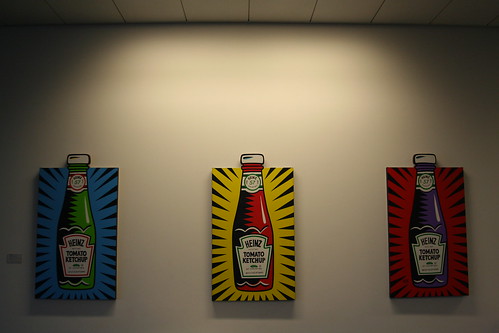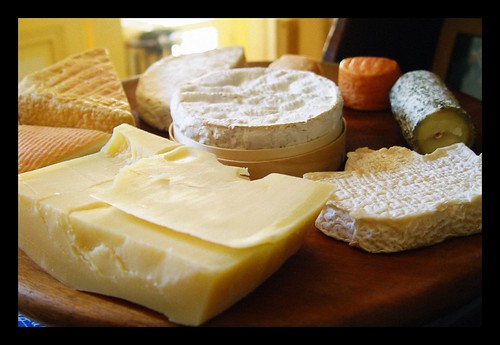It’s time for another installment of Word Soup Wednesday, in which we bring you some weird, funny, and interesting words from recent TV.
l’affaire est ketchup
Anthony Bourdain: “Across town [is] another thing entirely, the younger, wilder L’Affaire Est Ketchup, which I am reliably informed means ‘everything’s cool’ in local idiom.”
“Quebec,” Parts Unknown, May 5, 2013
We couldn’t find the origin of l’affaire est ketchup, which seems to mean everything from “everything’s okay,” to “it’s going to work,” to “it’s all good.” If anyone knows, please add it in the comments.
beavertail
Anthony Bourdain: “Beavertail, on the other hand, is not actually beaver at all, rather a quick spoonbread type of thing that in our case goes somewhat awry during an inadvertent inferno.”
“Quebec,” Parts Unknown, May 5, 2013
The beavertail is a kind of fried-dough pastry shaped like a beaver’s tail. BeaverTails are “a Canadian-based chain of pastry stands” founded in 1978. It’s unclear which came first, the pastry or the chain.
crackles
Dr. Turner [listening to Sister Bernadette’s lungs]: “Crackles on both sides.”
Episode 6, Call the Midwife, May 5, 2013
Crackles refer to “clicking, rattling, or crackling noises” in the lungs as a result of respiratory disorders should as pneumonia, pulmonary fibrosis, acute bronchitis, or, as in this episode of Call the Midwife, tuberculosis. Crackles were originally known as rales, French for “rattles,” a term developed by French physician René Laennec.
embarrassment of boobies
Zeke: “It’s an embarrassment of boobies!”
“Carpe Museum,” Bob’s Burgers, May 5, 2013
An embarrassment in this case is a mock collective noun, “a noun that denotes a collection of persons or things regarded as a unit,” in this case, “boobies.” Other collective nouns include a blush of boys, a superfluity of nuns, and a glaring of cats.
FARC
Anthony Bourdain: “Until recently most of the news coming out of this part of Colombia was not good. It was a front line in the War on Drugs, for lack of a better term, and Colombia’s long struggle with the FARC, a Marxist guerilla force financed by drug trafficking, kidnapping, and covert assistance from Venezuela.”
“Colombia,” Parts Unknowns, April 28, 2013
FARC stands for Fuerzas Armadas Revolucionarias de Colombia, or in English, Revolutionary Armed Forces of Colombia. The FARC is “considered a terrorist organization by the Government of Colombia.”
Glühenvolk
Rosalee: “When I was a kid, we used to think [Glühenvolk] were these beautiful, magical creatures that glowed in the dark. It was supposed be really good luck to see one, like the leprechaun legend.”
“Endangered,” Grimm, April 30, 2013
Glühenvolk translates from the German as “glow people.” Their bulbous heads, bioluminescence, and penchant for mutilating cows to obtain the ovaries for pregnant females (see also alien cattle mutilation) have led people in this episode to think they’re aliens.
orrery
Appraiser: “And this is what’s called a planetarium, or an orrery.”
“Rapid City,” Antiques Roadshow, May 6, 2013
An orrery is “a mechanical model of the solar system,” and was named “after Charles Boyle, Fourth Earl of Orrery (1676-1731), for whom one was made.”
pastagate
Anthony Bourdain: “So I was going to talk about the whole history of French Quebecois identity. A separatist movement, but I have to get right to the pressing matter of the day, pastagate. “
“Quebec,” Parts Unknown, May 5, 2013
Pastagate, as Bourdain says, “refers to an incident where local authorities [in Quebec] notified an Italian restaurant that they were in violation of French laws because they used the word ‘pasta’ which is Italian.”
Pastagate plays off Watergate, a scandal which occurred during the Nixon administration “involving abuse of power and bribery and obstruction of justice.” The suffix –gate has come to signify any scandal.
prom-posal
Stephen Colbert: “These days there’s something even more glamorous and expensive than the prom itself, the prom proposal, or as some zeigeist watchers are calling it, the prom-posal, which of course is a combo of the two words, pro and mposal.”
The Colbert Report, May 7, 2013
A prom-posal is the act of asking someone to the prom. “According to The New York Times,” says Colbert, “prom-posals have gotten so elaborate that teens are bringing in event planners, like the Heart Bandits, which charge $400 for orchestrating custom promposals.”
push the boat out
Mrs. Clark: “They didn’t even have a famous judge, which is where I thought we ought to push the boat out.”
Episode 5, Call the Midwife, April 28, 2013
Push the boat out is a British English idiom meaning to do something extravagantly, especially in regards to a celebration. According to the Oxford English Dictionary, the earliest citation is from 1920 and is also Navy slang for “to buy a round of drinks.”
The phrase seems to have originated from the once common practice of helping to push a beached boat into the water, which was considered an act of generosity.
snowball
Trixie: “Just a rather naughty version of eggnog. When you mix it with fizz, you get something called a snowball.”
Episode 5, Call the Midwife, April 28, 2013
A snowball refers to a variety of cocktails. The one in this episode could include a “generous measure of Advocaat” as Trixie has stashed a bottle of that drink under Jenny’s pillow.
spirit lamp
Sister Bernadette: “We struggle with these spirit lamps. They’re so old-fashioned and so fragile.”
Episode 5, Call the Midwife, April 28, 2013
A spirit lamp is “a lamp that burns alcohol or other liquid fuel,” where spirit refers to alcohol.
sugar shack
Anthony Bourdain: “The tradition of the cabane a sucre, or sugar shack, is as old as maple syrup here in Quebec, where 70 percent of the world’s supply comes from.”
“Quebec,” Parts Unknown, May 5, 2013
The sugar shack is a building where maple sap is collected and boiled down to make syrup. It’s also known as a sugar house or sugar shanty.
tablescaping
Linda: “One of our kids is actually participating in something. We’re going, even if it’s table setting.”
Gene: “It’s tablescaping, and it’s the most exciting competition on four legs.”
“Boyz 4 Now,” Bob’s Burgers, April 28, 2013
Tablescaping, as Gene says, “combines accurate table setting placement with creative themes and costumes.” The word is a blend of table and landscaping. Xeriscaping is landscaping for deserts while manscaping is the practice of trimming men’s facial and body hair.
tejo
Anthony Bourdain: “But I’m not really here for the climate. I’m here for tejo. It involves alcohol and explosives.”
“Colombia,” Parts Unknowns, April 28, 2013
Tejo, which translates from Spanish as “disc” or “hopscotch,” is a game in Colombia which involves throwing a metal disc at a board with a metal ring, or bocin, surrounded by “two to four triangular folded paper packets, called ‘mechas,’ which are filled with gunpowder-like material that explodes on impact.” The goal of the game is to “lodge the tejo puck inside the bocin, strike the mechas in order to create an explosion, and ultimately score the most points.”
tyromancy
Franklin: “You ever heard of tyromancy?”
Dr. Lecter: “Divination by cheese.”
“Sorbet,” Hannibal, May 9, 2013
Tyromancy is telling the future by reading the coagulation of cheese, specifically “the shape, number of holes, pattern of the mold and other characteristics,” according to this blog post recapping an episode of The Splendid Table.
Village maidens would “write the names of their prospective suitors on separate pieces of cheese and the one whose name was on the piece of cheese where molds grew first was believed to be the ideal love mate.” Another technique was related to myomancy, divination by mice, in which the possible answers to a question were written on pieces of cheese and placed in a cage with a mouse. Whichever piece the mouse ate first was the answer to the question.








